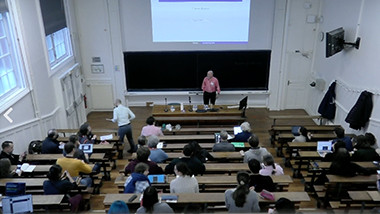
From connecting the dots to conjugacy of dynamical systems
By Pierre Arnoux
By Yuri Kifer
Appears in collection : Extreme value theory and laws of rare events / Théorie des valeurs extrêmes et lois des évènements rares
The Poisson limit theorem which appeared in 1837 seems to be the first law of rare events in probability. Various generalizations of it and estimates of errors of Poisson approximations were obtained in probability and more recently this became a popular topic in dynamics in the form of study of asymptotics of numbers of arrivals at small (shrinking) sets by a stochastic process or by a dynamical system. I will describe recent results on Poisson and compound Poisson asymptotics in a nonconventional setup, i.e. for numbers of events of multiple returns to shrinking sets, namely, for numbers of combined events of the type $\left \{ \omega : \xi \left ( jn,\omega\right )\in \Gamma_N,j = 1,...,\ell \right },n\leq N$ where $\xi \left ( k,\omega \right )$ is defined as a stochastic process from the beginning or it is built from a dynamical system by writing $\xi \left ( k,\omega \right )=T^k\omega .$ We obtain an essentially complete description of possible limiting behaviors of distributions of numbers of multiple recurrencies to shrinking cylinders for $\psi $-mixing shifts. Some possible extensions and related questions will be discussed, as well. Most of the results were obtained jointly with my student Ariel Rapaport and some of them are new even for the widely studied single (conventional) recurrencies case. Keywords : Poisson limit theorems - nonconventional sums - multiple recurrence
